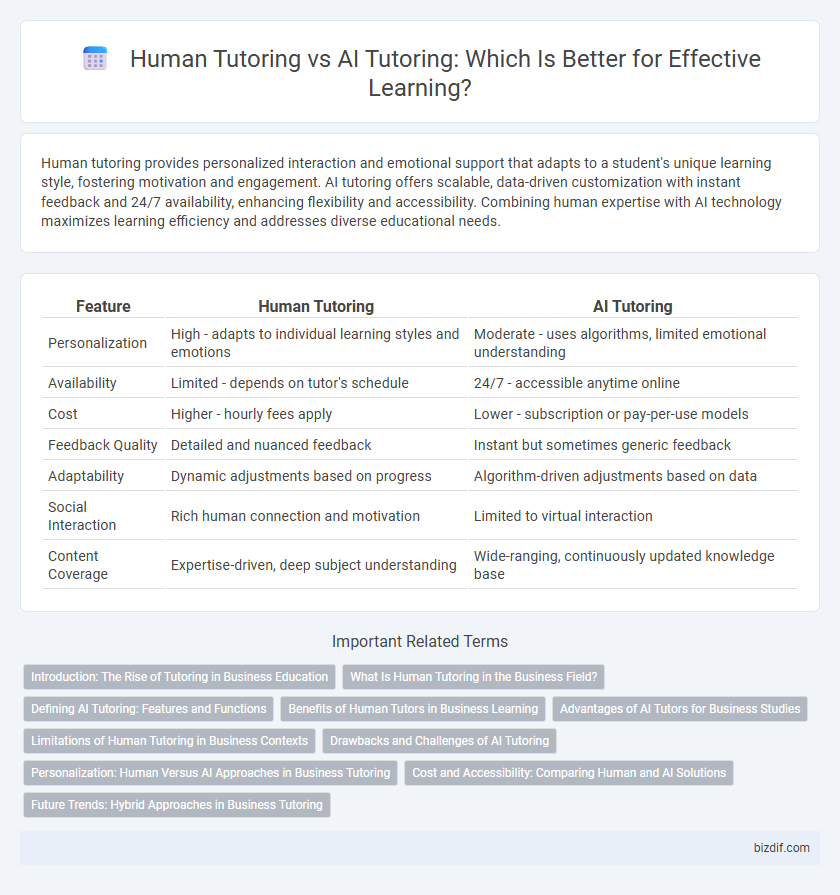Human tutoring provides personalized interaction and emotional support that adapts to a student's unique learning style, fostering motivation and engagement. AI tutoring offers scalable, data-driven customization with instant feedback and 24/7 availability, enhancing flexibility and accessibility. Combining human expertise with AI technology maximizes learning efficiency and addresses diverse educational needs.
Table of Comparison
| Feature | Human Tutoring | AI Tutoring |
|---|---|---|
| Personalization | High - adapts to individual learning styles and emotions | Moderate - uses algorithms, limited emotional understanding |
| Availability | Limited - depends on tutor's schedule | 24/7 - accessible anytime online |
| Cost | Higher - hourly fees apply | Lower - subscription or pay-per-use models |
| Feedback Quality | Detailed and nuanced feedback | Instant but sometimes generic feedback |
| Adaptability | Dynamic adjustments based on progress | Algorithm-driven adjustments based on data |
| Social Interaction | Rich human connection and motivation | Limited to virtual interaction |
| Content Coverage | Expertise-driven, deep subject understanding | Wide-ranging, continuously updated knowledge base |
Introduction: The Rise of Tutoring in Business Education
The rise of tutoring in business education reflects a growing demand for personalized learning solutions that enhance student performance and engagement. Human tutoring offers tailored feedback and emotional support tailored to individual learning styles, fostering deeper understanding and motivation. AI tutoring leverages advanced algorithms and real-time data analysis to provide scalable, adaptive instruction that can complement traditional methods and improve learning outcomes efficiently.
What Is Human Tutoring in the Business Field?
Human tutoring in the business field involves personalized guidance and mentorship provided by experienced professionals who tailor lessons to individual learning styles and career goals. This form of tutoring emphasizes real-time interaction, contextual understanding, and adaptive feedback, which are crucial for mastering complex business concepts such as finance, marketing, and leadership. Human tutors leverage industry-specific knowledge and soft skills coaching to enhance critical thinking and problem-solving abilities essential in dynamic business environments.
Defining AI Tutoring: Features and Functions
AI tutoring utilizes advanced machine learning algorithms to provide personalized learning experiences, adapting content and pacing based on student performance, unlike traditional human tutoring that relies on real-time emotional and cognitive cues. Core features of AI tutoring systems include interactive problem-solving, immediate feedback, and data-driven progress tracking to optimize learning outcomes. These systems function through natural language processing and predictive analytics, enabling customized instruction that scales efficiently across diverse learners.
Benefits of Human Tutors in Business Learning
Human tutors in business learning offer personalized feedback that adapts to individual learning styles and real-time problem-solving scenarios, enhancing comprehension and practical application. Their ability to provide nuanced explanations and mentorship fosters critical thinking and soft skills such as communication and negotiation, which are essential for business success. Moreover, human tutors can tailor case studies and role-playing exercises to align with specific business contexts, driving deeper engagement and more effective skill acquisition.
Advantages of AI Tutors for Business Studies
AI tutors in Business Studies offer personalized learning experiences through adaptive algorithms that analyze student progress and customize content accordingly. They provide 24/7 accessibility, enabling uninterrupted study sessions and immediate feedback on complex topics like financial analysis and marketing strategies. Furthermore, AI-driven platforms reduce costs and scale efficiently, making quality business education accessible to a broader audience without compromising personalized attention.
Limitations of Human Tutoring in Business Contexts
Human tutoring in business contexts often struggles with scalability and consistency, limiting its ability to serve large or diverse employee groups effectively. The reliance on individual tutors can lead to variability in teaching quality and scheduling conflicts, reducing the overall efficiency of training programs. Moreover, human tutors may lack real-time data analytics capabilities crucial for personalized feedback and performance tracking in dynamic business environments.
Drawbacks and Challenges of AI Tutoring
AI tutoring faces challenges such as limited emotional intelligence, which hinders personalized support and understanding of complex student needs. Technical issues, including algorithm biases and lack of adaptive reasoning, can result in ineffective learning experiences. Dependence on AI tutoring may reduce human interaction, potentially impacting motivation and critical thinking development.
Personalization: Human Versus AI Approaches in Business Tutoring
Human tutoring in business education offers personalized insights driven by real-world experience and emotional intelligence, enabling tailored feedback and adaptive learning strategies aligned with individual student needs. AI tutoring systems utilize data analytics and machine learning algorithms to customize content delivery, track progress, and identify knowledge gaps at scale, providing consistent and immediate responses. The combination of human intuition and AI's analytical capabilities creates a hybrid model that enhances personalization and effectiveness in business tutoring.
Cost and Accessibility: Comparing Human and AI Solutions
Human tutoring often involves higher costs due to personalized attention and the need for skilled educators, limiting accessibility for many students. AI tutoring platforms offer scalable solutions with lower costs, enabling more widespread and affordable access to quality educational support. This cost-effectiveness and accessibility make AI tutoring a viable alternative for learners in diverse geographic and economic settings.
Future Trends: Hybrid Approaches in Business Tutoring
Future trends in business tutoring emphasize hybrid approaches that combine human expertise with AI-driven tools to optimize learning outcomes. AI algorithms personalize content delivery and track progress, while human tutors provide critical thinking guidance and contextual insights. This integrated model enhances scalability and effectiveness, positioning hybrid tutoring as a key strategy for corporate training programs.
Human Tutoring vs AI Tutoring Infographic

 bizdif.com
bizdif.com